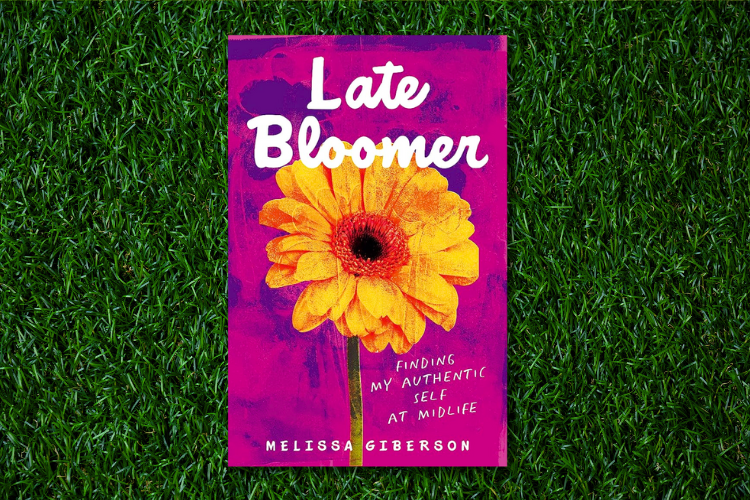
A Tale of Midlife Self-Discovery
Melissa Giberson found out that divorcing a husband of many years and telling her kids that she was gay was the hardest thing she’d ever done and she charts her journey in Late Bloomer (She Writes Press, $17.95). Giberson talks to fiction editor Yona Zeldis McDonough about why she has no regrets and what she’s learned along the way.
Yona Zeldis McDonough: What made you want to tell this story now?
MG: When I was first embarking on my journey, I searched for anything to help me understand what was happening. The first book I found provided me with some relief at knowing I wasn’t alone in the feelings I was experiencing. That validation held a lot of currency. I wanted to add my story with its full experience—from the initial attraction, the confusion, the fear, and ultimately to self-acceptance, but also to diving into the LGBTQ community, and the reality of transitioning from a deeply-rooted and societally supported relationship to a different one. I wanted to share the advice I was given and describe how my story unfolded in hopes it might help someone else going through their own journey.
Storytelling is how we validate one another’s experiences and inspire others to tell their stories. Telling my story gives visibility at a time when people are being taught to fear others because of their gender, faith, or sexuality. I see the increasing rhetoric, antisemitism, and violence against the communities with which I identify: women, Jewish, and gay. I’m the person who lives next door, who might help you recover after an injury in my role as an occupational therapist or is the person you say hello to as you walk by my house while I’m gardening. I’m not to be feared.
YZM: How did your Jewish values and background play into your choices?
MG: Growing up in an Orthodox Jewish neighborhood, although my family was not observant, my neighbors wished me “Good Shabbos,” invited me into their Sukkahs in Fall, and delivered Purim treats to my house in late winter/early Spring. As I got older, I babysat their children. These were my roots.
I hold tight to a simple, live-and-let-live philosophy that was modeled for me as a child and reinforced as an adult in a temple that prided itself on Tikkun Olam—relying on acts of charity, kindness, and political action toward creating a more peaceful and equal world.
I watched my earliest neighbors practice their religion with pride. Later, with my children, we lived according to our values by helping others.
When it was time to make a difficult choice about my own life, I wanted to model authenticity for my children and remain true to my beliefs.
YZM: How did your children handle the changes in your life—and in theirs?
MG: The hardest part for my children was knowing we wouldn’t continue to live together as a family. Being a child of divorce, I knew how it felt to live by a schedule and have your life disrupted. We adjusted as necessary to the dynamic changes. It was never easy, but we made it work.
Now that we’re on the other side of it, my children have emerged as compassionate adults who are driven and kind. They work hard, and do well in school, their jobs, and their relationships.
They have a good relationship both with their dad and with me and with our respective partners.
It didn’t unfold the way I had hoped but I’m very proud of my children and the people they are.
We’re dynamic creatures who sometimes try to live static lives. This denies us the opportunity for self-discovery, to make those adjustments we need to continue evolving.
YZM: Were you surprised by your mother’s reaction to your revelation?
MG: Knowing how much my mom liked my husband, I was fearful of how she’d respond to the news of our separation. When she said, “Life’s too short to be unhappy,” without asking any questions, I expected she’d be understanding when I told her why we had separated, even though I was nervous to tell her—mostly because it was still so new.
She has never been anything but supportive once she found out and I’m grateful for how she’s shown up since.
YZM: What advice do you have for other midlife women who are grappling with these issues?
MG: As an occupational therapist, I often tell my patients, “Your body will talk to you, your job is to listen.”
This is usually in the context of recovering from an injury, but it applies equally to those fleeting internal messages we receive that we’re quick to dismiss. It’s hard to turn inward and it’s easy to make countless excuses as to why we can’t, “right now.” In the end, when we dismiss these internal nudges, we’re self-sabotaging. We’re dynamic creatures who sometimes try to live static lives. This denies us the opportunity for self-discovery, to make those adjustments we need to continue evolving.
My advice is, don’t deny yourself the right to explore the path you’re on and don’t settle if something is telling you you’re not on the best one. Find your people—others who may also be struggling or who’ve made it to the other side. There are books, support groups, workshops, and communities on social media. Find the support that best suits your needs but don’t struggle alone.



